
JOURNAL OF LITERACY RESEARCH
Scope & Guideline
Connecting theory and application in the world of literacy.
Introduction
Aims and Scopes
- Interdisciplinary Approaches to Literacy:
The journal encourages research that draws on various disciplines, including education, sociology, linguistics, and cultural studies, to explore the complexities of literacy practices. - Focus on Diverse Populations:
It highlights literacy issues among marginalized groups, including racial and ethnic minorities, bilingual learners, and individuals with disabilities, emphasizing the need for inclusive literacy education. - Critical Literacy and Social Justice:
The journal promotes critical literacy that interrogates power dynamics and advocates for social justice in literacy education, examining how literacy can empower individuals and communities. - Innovative Literacy Practices and Pedagogy:
Research on innovative teaching methods and practices is a core focus, particularly those that leverage technology and multimodal texts to enhance literacy learning. - Cultural and Contextual Influences on Literacy:
The journal examines how cultural, social, and contextual factors shape literacy practices, encouraging studies that consider local and global perspectives.
Trending and Emerging
- Digital and Media Literacies:
There is a growing emphasis on digital and media literacies, examining how technology and digital platforms shape literacy practices and learning environments. - Social Justice and Equity in Literacy:
Research that focuses on social justice, equity, and advocacy within literacy education is increasingly prominent, reflecting a commitment to addressing systemic inequalities. - Multimodal Literacy Practices:
The exploration of multimodal literacy, which includes visual, auditory, and digital texts, is gaining attention, recognizing the diverse ways individuals engage with texts. - Culturally Sustaining Pedagogies:
Emerging themes around culturally sustaining pedagogies highlight the importance of incorporating students' cultural backgrounds and experiences into literacy instruction. - Transnational and Global Perspectives:
Research that examines literacy practices across transnational contexts and global perspectives is on the rise, showcasing the interconnectedness of literacy in a globalized world.
Declining or Waning
- Traditional Literacy Assessments:
Research centered on conventional literacy assessments and standardized testing has seen a decrease, as the focus shifts towards more holistic and inclusive measures of literacy. - Static Views on Literacy Development:
There is a waning interest in static or linear models of literacy development, with newer research emphasizing dynamic, context-dependent, and socially situated approaches. - Monolingual Literacy Practices:
Studies strictly focusing on monolingual literacy practices are less prominent, reflecting a broader recognition of the importance of bilingualism and multilingualism in literacy research. - Literacy as a Solely Individual Skill:
The perception of literacy as an individual skill, devoid of social context, is declining; current research increasingly situates literacy within social networks and community practices. - Narrow Definitions of Literacy:
Research that confines literacy to traditional reading and writing skills is diminishing, as the field expands to incorporate digital, media, and multimodal literacies.
Similar Journals
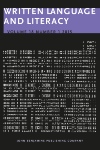
Written Language and Literacy
Pioneering Research at the Intersection of Language and LearningWritten Language and Literacy is a leading academic journal that has been at the forefront of language and literacy research since its inception in 1998. Published by John Benjamins Publishing Co in the Netherlands, this journal provides a platform for innovative and rigorous studies exploring the intersections of language, literacy, and cognitive processes. With an impressive impact factor and classified in the Q2 category for Linguistics and Language, it offers valuable insights and methodologies that contribute significantly to the field. The journal ranks 498th out of 1088 in Arts and Humanities and 577th out of 1167 in Social Sciences, placing it firmly within the academic conversation on language studies. Though it does not offer open access, it remains highly sought after by researchers, professionals, and students, ensuring a rich collection of knowledge essential for advancing literacy and language practices in diverse contexts.

Ocnos-Journal of Reading Research
Cultivating Knowledge for a Deeper Engagement with LiteratureOcnos-Journal of Reading Research is a leading peer-reviewed journal dedicated to advancing the field of reading research, with a specific focus on literature, education, and psychological aspects of reading. Published by UNIV CASTILLA-LA MANCHA, CENTRO ESTUDIOS PROMOCION LITERATURA INFANTIL, this open-access journal, available since 2005, aims to provide a platform for innovative studies, critical reviews, and educational resources that inform and inspire scholars, practitioners, and students alike. With an impressive positioning in the Q2 category in Education and Q1 in Literature and Literary Theory as of 2023, it is recognized for its high impact in these disciplines, evidenced by its strong rankings within Scopus. Situated in Cuenca, Spain, Ocnos fosters international dialogue and research collaboration, making it a vital resource for those engaged in the exploration of reading as a multifaceted phenomenon. Whether you are interested in theoretical frameworks or practical applications, Ocnos offers invaluable insights that contribute to the field's evolution and understanding.
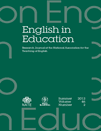
English in Education
Championing Scholarly Excellence in Language and LiteratureEnglish in Education, published by Taylor & Francis Ltd, is a premier journal dedicated to the broad field of education, with a specific focus on the interplay of language, literature, and pedagogy. Since its inception in 1964, this esteemed journal has become a vital resource for researchers, educators, and students alike, offering a platform for innovative research and scholarly discourse. With an impressive impact factor and categorized in the top quartiles of both Linguistics and Language, and Literature and Literary Theory, it ranks among the top journals in its field, denoting its significance and influence. The journal aims to advance understanding and practice in English education through rigorous peer-reviewed articles, theoretical explorations, and empirical studies that address contemporary challenges and developments in these intertwined disciplines. The journal’s commitment to excellence is reflected in its Scopus rankings, highlighting its critical role in fostering research that informs and enriches educational practices. Although currently not open access, English in Education remains an essential outlet for professionals seeking to contribute to the evolving landscape of English language and literature education.
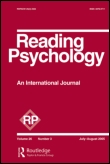
Reading Psychology
Enhancing Literacy Through Psychological InsightsReading Psychology, published by Routledge Journals, Taylor & Francis Ltd, is an esteemed journal dedicated to exploring the multifaceted relationship between reading processes and psychological principles. Since its establishment in 1979, this journal has provided a crucial platform for researchers, educators, and psychologists, addressing pivotal themes in Developmental and Educational Psychology, Education, and Linguistics and Language. With a commendable impact factor and a robust ranking within Scopus across multiple categories, including Q1 in Linguistics and Language, Reading Psychology plays an indispensable role in advancing scholarly discourse. Although it currently does not provide Open Access options, it remains a vital source of innovative research that informs theory and practice. The journal aims to cultivate a deeper understanding of reading behaviors, foster interdisciplinary collaboration, and ultimately enhance educational techniques, making it essential reading for anyone committed to the study of reading and cognition.
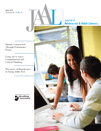
JOURNAL OF ADOLESCENT & ADULT LITERACY
Fostering Literacy through Research and InnovationJOURNAL OF ADOLESCENT & ADULT LITERACY is a prestigious publication dedicated to the exploration and enhancement of literacy education for adolescents and adults. Published by Wiley, this journal holds an important position in the educational research landscape, marked by its Q2 ranking in Education for 2023, reflecting its commitment to high-quality scholarship. With an ISSN of 1081-3004 and an E-ISSN of 1936-2706, this journal serves as an essential resource for educators, researchers, and policy-makers in understanding literacy development, instructional practices, and the sociocultural factors influencing literacy. Covering a comprehensive timeline from 1995 to 2024, the journal is well-known for its rigorous peer-reviewed articles, providing insights into innovative practices and empirical research that support literacy advancement. Located in the United States, with its headquarters at 111 RIVER ST, HOBOKEN 07030-5774, NJ, the journal does not offer open access but remains an invaluable asset for stakeholders in the realm of education, encouraging discourse and collaboration to foster literacy in diverse and dynamic contexts.
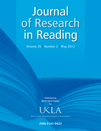
JOURNAL OF RESEARCH IN READING
Fostering dialogue in reading education and psychology.JOURNAL OF RESEARCH IN READING, published by Wiley, stands as a premier scholarly platform dedicated to advancing the understanding of reading research within the disciplines of education and psychology. Established in 1978, this impactful journal offers rigorous peer-reviewed articles that explore the multifaceted nuances of reading processes, literacy development, and instructional strategies, making it an essential resource for educators, psychologists, and researchers alike. With an impressive Q1 ranking in developmental and educational psychology, education, and miscellaneous psychology categories, and notable positions in Scopus rankings, the journal maintains a strong reputation for the quality and relevance of its contributions to the field. Although it operates under a traditional subscription model, the journal ensures broad access to its vital research findings, supporting the ongoing dialogue in an ever-evolving academic landscape. As it approaches its landmark 2024 edition, JOURNAL OF RESEARCH IN READING continues to serve as a vital conduit for innovative research and critical insights into literacy and reading education.

Literacy Research and Instruction
Elevating literacy instruction through rigorous scholarship.Literacy Research and Instruction is a prestigious scholarly journal dedicated to advancing the field of education, with a particular emphasis on literacy research and pedagogical strategies. Published by Routledge Journals, Taylor & Francis Ltd in the United Kingdom, this journal has established itself as a significant resource for scholars, educators, and practitioners engaged in the intricate processes of learning and language acquisition. With an impressive impact factor and a well-regarded position in the Q1 category of Linguistics and Language and Q2 in Education, it is ranked highly among its peers, both in Scopus Ranks and overall academic impact. The journal covers a broad range of topics in literacy education, making it essential reading for those conducting innovative research and seeking evidence-based instructional practices. By providing valuable insights and fostering scholarly discourse, Literacy Research and Instruction plays a vital role in shaping effective literacy education practices worldwide.
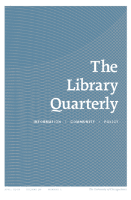
LIBRARY QUARTERLY
Championing Excellence in Library ScholarshipLIBRARY QUARTERLY, published by University of Chicago Press, stands as a premier academic journal in the field of Library and Information Sciences. With an ISSN of 0024-2519 and an E-ISSN of 1549-652X, this journal has been a vital source of scholarship since its inception in 1946. Positioned in the Q1 category for its field, it ranks #79 out of 280 in Scopus, reflecting its significant influence and quality as recognized by the academic community. Although it does not offer open access, LIBRARY QUARTERLY provides an indispensable platform for research and discourse on library practices, information management, and related technologies. Its scope encompasses a wide range of topics pertinent to both traditional and emerging issues within libraries, serving as an essential resource for researchers, professionals, and students alike. By engaging with this journal, readers gain access to cutting-edge research that shapes the future of library science and inspires innovative practices within the field.
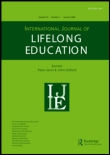
International Journal of Lifelong Education
Navigating the Journey of Lifelong EducationThe International Journal of Lifelong Education, published by Routledge Journals, Taylor & Francis Ltd, is a leading peer-reviewed journal dedicated to the dynamic field of lifelong learning. With an impressive convergence of research spanning from 1982 to 2024, the journal focuses on vital themes in education, e-learning, and life-course studies, and boasts a commendable Q2 ranking within its categories for 2023. It serves as an essential platform for researchers, educators, and professionals to explore and share innovative ideas and practices that address the complexities of lifelong learning in today's rapidly changing educational landscape. Although it does not currently offer Open Access, the journal provides robust access options through various academic databases, ensuring a wide audience reach. With its significant impact within the field, exemplified by its Scopus ranks—528th in Education and 30th in Life-span Studies—this journal is indispensable for those seeking to contribute to and stay informed about the latest advancements in lifelong education.
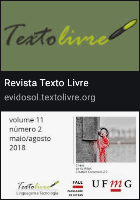
Texto Livre-Linguagem e Tecnologia
Unlocking the Potential of Language in a Digital World.Texto Livre-Linguagem e Tecnologia is a prominent academic journal published by the Federal University of Minas Gerais, Faculty of Letters, specializing in the interdisciplinary domains of language, technology, and communication. Since its establishment, the journal has embraced an Open Access model, fostering unrestricted dissemination of research findings. With an ISSN of 1983-3652, it aims to bridge theoretical insights and practical applications in linguistics and technology, thereby enriching scholarly dialogues worldwide. The journal's recent classifications in the 2023 Category Quartiles highlight its relevance, achieving Q3 in Communication, Q4 in Computer Science Applications, and Q2 in Linguistics and Language. Additionally, it has earned respectable Scopus rankings, placing it within the 71st percentile for Language and Linguistics in the Arts and Humanities. This positions Texto Livre as a vital resource for researchers, professionals, and students keen on exploring the dynamic interplay between language and technology. By engaging with cutting-edge research, contributors and readers alike can shape the future discourse in these critical fields.